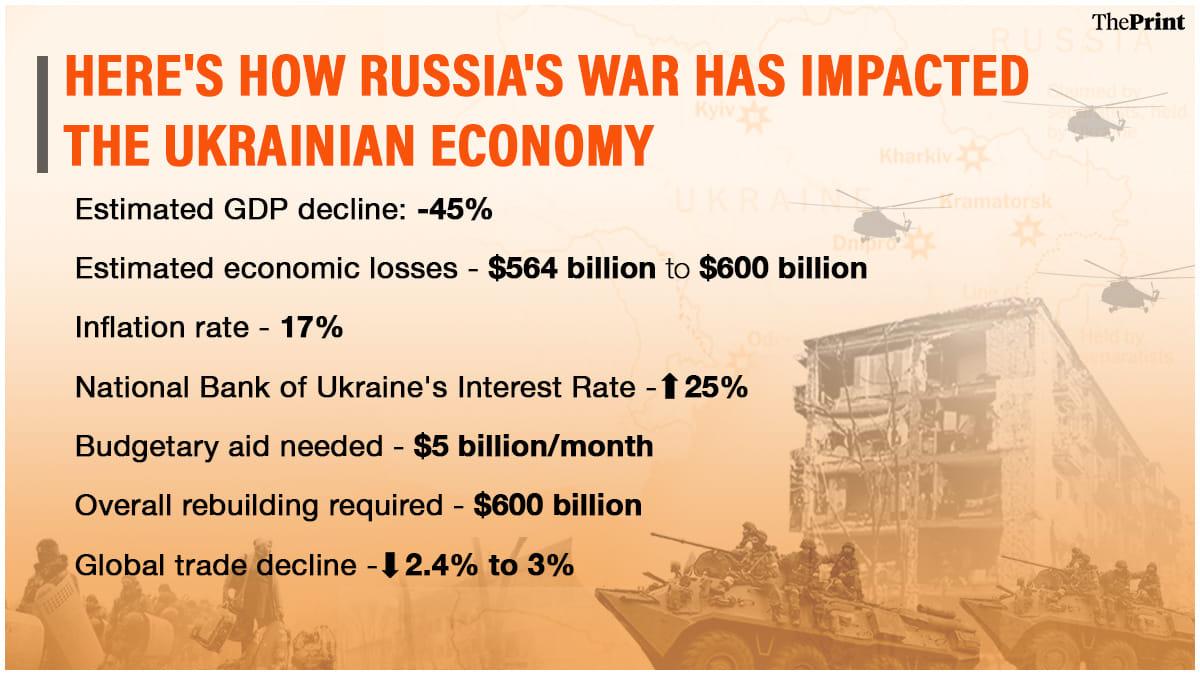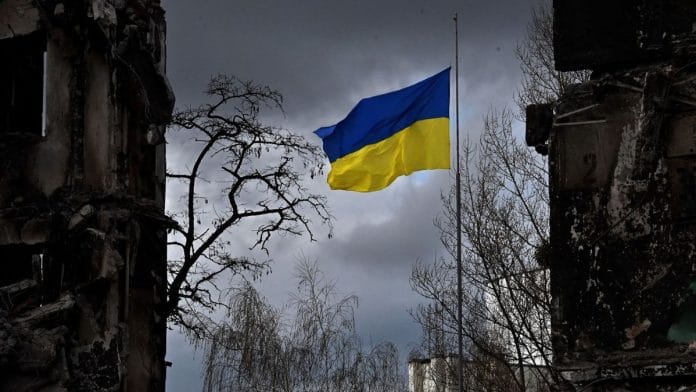New Delhi: It has now been more than 100 days since Russia launched its invasion of Ukraine. While the stalemate in the east of the country remains, with a battle of attrition now playing out, the knock-on effect of the war on Ukraine’s economy has been devastating.
In 2021, the International Monetary Fund (IMF) had projected that Ukraine’s per capita GDP would grow by 3.6 per cent this year amid Russia’s gradual buildup of troops at the country’s border.

The World Bank, in a report released in April, predicted that Ukraine’s economy could shrink by as much as 45 per cent due to the war, while projected the Russian economy to plunge by 11.1 per cent as the sanctions bite.
“The war is also hitting hard the emerging and developing economies of Europe and Central Asia, a region that was already heading for an economic slowdown this year from the ongoing effects of the pandemic,” the World Bank said in its forecast published on 10 April.
State of economic losses
Domestic estimates from Ukraine’s Ministry of Economy and the Kyiv School of Economics, put current economic losses between $564 billion and $600 billion — or nearly four times the country’s annual GDP.
“The magnitude of the humanitarian crisis unleashed by the war is staggering. The Russian invasion is delivering a massive blow to Ukraine’s economy and it has inflicted enormous damage to infrastructure,” said Anna Bjerde, World Bank’s vice president for the Europe and Central Asia region, in the report.
“Ukraine needs massive financial support immediately as it struggles to keep its economy going and the government running to support Ukrainian citizens who are suffering and coping with an extreme situation,” Bjerde added.
Rising interest rates & inflation
Apart from the collapsing economy, inflation and interest rates have also risen in Ukraine because of the war.
As cited by the Financial Times, the latest data on consumer inflation from the National Bank of Ukraine said the rate had shot up to 17 per cent in May, a continued increase from 16.4 per cent in April, 13.7 per cent in March, 10.7 per cent in February prior to the war.
NBU Governor Kyrylo Shevchenko Thursday said the country’s central bank board has decided to raise its benchmark lending rate from 10 per cent to 25 per cent in a move to tackle the spiralling inflation.
The move will make borrowing extremely expensive in an already demand-depleted economy. Taking borrowing costs to their highest level in Europe. And the highest in Ukraine since September 2015 – when Ukraine’s economy was reeling from Russia’s annexation of Crimea.
Explaining the massive rate hike, the National Bank of Ukraine said “a smaller rise would have had no significant influence on the financial and economic system during wartime because of the likely limited effect on asset prices”.
They further added a small rate hike would also deter investors and make depositors take a wait-and-see approach.
Global tailwinds and future of Ukraine’s economy
Globally, the war in Ukraine is going to have larger impacts on recovery cycles from the shocks of the pandemic.
In April, the World Trade Organisation announced that the war could lower global economic growth by as much as 1.3 per cent and cut global trade growth from 4.7 per cent to between 2.4 and 3 per cent this year.
So what of any prospects of Ukraine’s economic future? According to the Wall Street Journal, Ukraine Prime Minister Denys Shymhal had said in late April that his country needs $5 billion per month in budgetary support until at least September, as well as an overall $600 billion for rebuilding efforts.
Despite the importance of mineral commodities and industrial centres, Ukraine primarily remains an agrarian economy, labelled Europe’s breadbasket and among the world’s largest exporters of wheat, before its supply chains, such as the port of Odessa, were brought to a screeching halt by blockades imposed by Russia during the war.
Major importer Egypt was among the countries hit hard as a consequence of the war and since February, sought alternatives to Russia and Ukraine for wheat.
Also read: In major defeat, Ukraine loses key railway hub to Russia but counterattacks in Kherson






